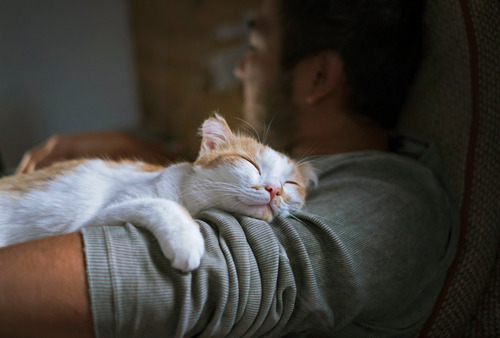When you hear the gentle rumble of a cat purring, it might seem like a simple expression of contentment. However, the reasons behind why cats purr are diverse and fascinating. This blog explores the intriguing world of cat purrs, shedding light on this common yet mysterious behavior. If you have questions about your cat’s health or behavior, feel free to call Pet Townsend Veterinary Clinic at (360) 379-1133 or request an appointment online.
What is Purring and How Do Cats Purr?
Purring is a sound made by some species of felids and other animals. In cats, it involves the rapid movement of the muscles within their larynx, combined with intermittent signaling from a neural oscillator in their brain. This action causes vibrations in their vocal cords, especially when they breathe in and out. The result is the purr we hear.
The Mechanics Behind Purring
Understanding how cats purr involves looking at the specifics of their anatomy. The central nervous system communicates with the voice box muscles, causing them to twitch at a rate of 25 to 150 vibrations per second (Hz). This rapid movement produces a consistent purr sound.
Why Do Cats Purr?
Cats purr for various reasons, ranging from happiness to stress or even pain. Below are the most common reasons why cats purr, providing insight into this complex behavior.
- Communication: From a young age, kittens purr to communicate with their mother, often during nursing. This early communication establishes purring as a form of interaction within their social structure.
- Healing Mechanism: Research suggests that purring may have a therapeutic healing ability on bones and tissues. The frequencies of a cat’s purr (25 to 150 Hz) are therapeutic in promoting tissue regeneration, which is why cats might purr when they are recovering from injury or illness.
- Stress Relief: Just as people might hum or sing to calm themselves, cats use purring as a self-soothing mechanism. This behavior can occur in various situations, whether they are content or under duress.
Different Situations Where Cats Purr
Cats don’t just purr when they’re happy. Understanding the context of your cat’s purring can provide valuable insights into their well-being.
Purring When Content
The most well-known reason cats purr is when they feel content and relaxed—typically when they’re in a comfortable environment or receiving affection from their owners.
Purring as a Sign of Distress
Conversely, cats also purr when they are anxious or in pain. Observing the circumstances under which your cat purrs is crucial for understanding their emotional or physical state.
Purring for Attention
Some cats purr to capture the attention of their humans. If your cat purrs and simultaneously displays other behaviors like rubbing against you or looking at you, it’s likely they are seeking interaction or something specific, like food or play.
How to Respond to Your Cat’s Purring
Recognizing why your cat purrs is essential for providing the appropriate response and care. Here’s how you can better connect with your cat through understanding their purring:
- Pay close attention to when and how your cat purrs. Noticing patterns can help you better understand their needs and feelings.
- If your cat purrs due to distress or discomfort, it’s important to offer comfort. Make their environment peaceful and consult with a vet if you suspect health issues. Remember, you can always call Pet Townsend Veterinary Clinic at (360) 379-1133 for advice or to schedule a check-up.
- For purrs that signal contentment, continue engaging in activities that your cat enjoys. This positive reinforcement helps strengthen your bond and keeps your cat happy.
Decoding the Secrets of Your Cat’s Purr
While purring is often associated with positive feelings, it’s a complex behavior that serves multiple communicative and healing functions in cats. By paying attention to the context of your cat’s purring, you can enhance your understanding of their needs and improve their overall well-being. For any concerns about your cat’s health or behavior, contact Pet Townsend Veterinary Clinic at (360) 379-1133 or book an appointment online. Understanding your cat’s purring can lead to a stronger, more responsive relationship between you and your pet, ensuring their happiness and health.





